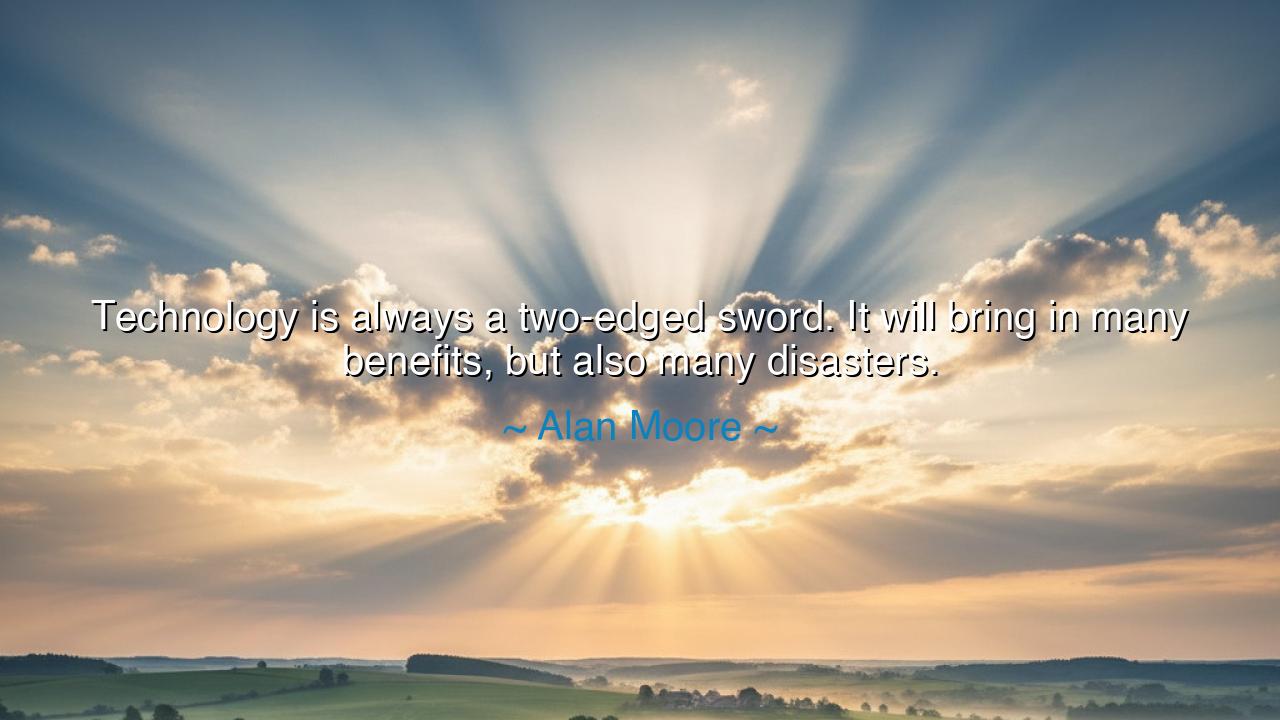
Technology is always a two-edged sword. It will bring in many
Technology is always a two-edged sword. It will bring in many benefits, but also many disasters.






Hear the solemn warning of Alan Moore, a seer of our age, who declared: “Technology is always a two-edged sword. It will bring in many benefits, but also many disasters.” These words are not idle breath, but the echo of history itself, repeated across the centuries. For every invention mankind has forged, from the plow to the microchip, has carried both promise and peril. To wield technology is to hold a blade that can defend or destroy, nourish or consume, liberate or enslave.
From the beginning, this truth has revealed itself. When humankind first tamed fire, it brought warmth to the cold, protection from beasts, and the power to cook food and craft tools. Yet the same fire, uncontrolled, consumed villages, razed forests, and left ashes in its wake. Was fire good or evil? Neither. It was the wielder who gave it meaning, proving that technology itself is not fate, but a mirror of human intent. Thus Moore speaks rightly of the two-edged sword: every gift of invention hides a shadow.
Consider the age of the Industrial Revolution. Steam engines, looms, and factories transformed society, lifting millions from poverty, creating abundance where once there was scarcity. Yet alongside these blessings came choking smog, cities drowned in filth, workers bent in misery, and children condemned to endless labor. Progress was real, but so was suffering. The same machines that promised liberation also demanded a price. Here we see the two-edged sword gleaming: prosperity on one side, despair on the other.
And what of the twentieth century, when the atom was split? Nuclear technology promised energy enough to power cities, clean and vast beyond imagining. Yet from the same discovery was born the bomb, which fell upon Hiroshima and Nagasaki with a light brighter than the sun, bringing death to tens of thousands in a single instant. This is Moore’s warning made flesh: the same knowledge that could save humanity from want also gave us the power to end it. The sword of technology, sharper than ever, cut both ways.
But let us not despair, children of tomorrow, for this sword can yet be wielded with wisdom. It is not in the nature of technology to decide our fate, but in the choices of those who command it. The printing press spread both scripture and slander, yet it also gave birth to enlightenment. The internet connects friends across continents, yet it also spreads lies like wildfire. The lesson is clear: we must learn to hold the sword by the hilt, not the blade, guiding it with conscience and restraint.
The wisdom to take is this: do not worship technology as a savior, nor curse it as a demon. Instead, see it as power—neutral, dangerous, and full of potential. Ask always: what are the costs? Who is harmed? Who is helped? For the true test of any invention lies not in its marvel, but in the justice of its use. The sword cannot be sheathed, for progress moves ever onward. But it can be directed, and its edge turned toward life rather than death.
Practical steps are within your reach: use your tools to create, not merely to consume. Support innovations that heal the earth rather than strip it bare. Demand wisdom from leaders who would wield powerful technologies in your name. And within your own life, choose to wield your devices with discipline: let them connect you, not isolate you; let them teach you, not enslave you. In this way, you prove yourself a master of the sword, not its victim.
Thus remember Alan Moore’s truth: “Technology is always a two-edged sword.” It has always been so, from fire to steel, from electricity to the stars. It is not the edge itself that decides our fate, but the hand that holds it. Hold it wisely, and you shall build a brighter world. Hold it carelessly, and you may burn all that you love. The choice, as it has always been, lies not in the blade—but in you.






AAdministratorAdministrator
Welcome, honored guests. Please leave a comment, we will respond soon